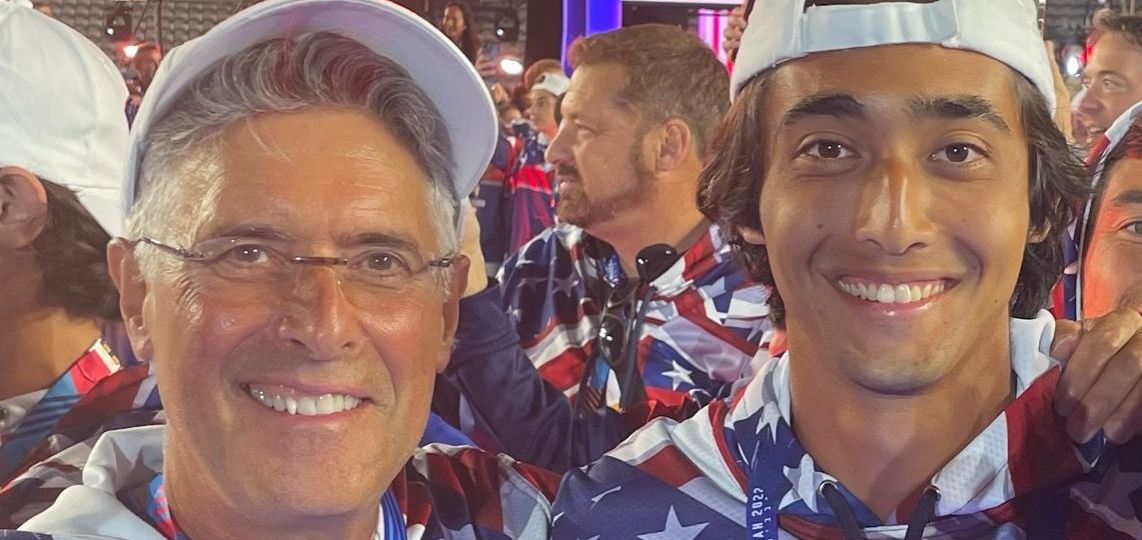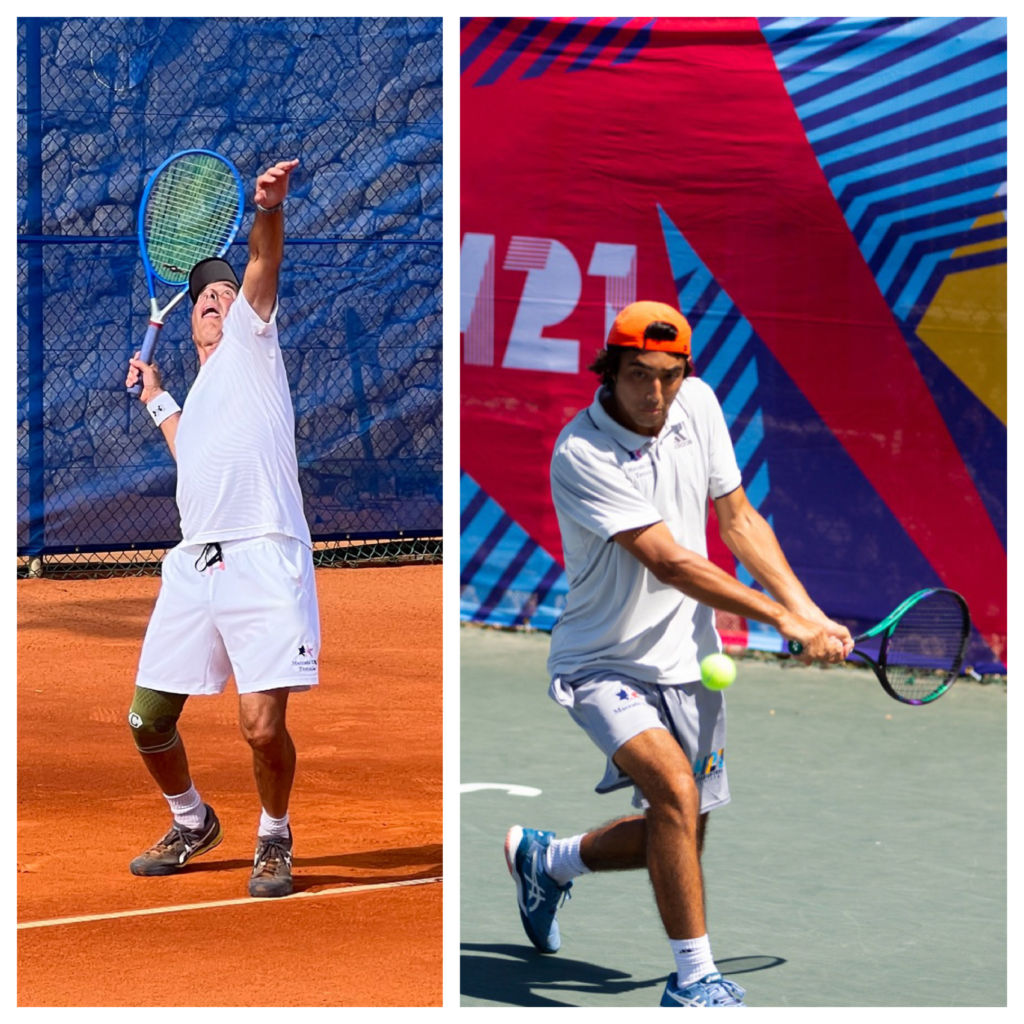
Written By Sam Oshtry
Maccabi USA grand master tennis player Michael Morgenstern won a bronze medal in the 20th Maccabiah in 2017 with his son, Akira Morgenstern, right by his side. Akira was just 14-years-old at the time and too young to participate in The Games. But Akira, a tennis player himself, helped his dad Michael warm up before every game and was fence-side for every match his father played.
In the bronze medal match, Michael hurt his ankle. He contemplated forfeiting the match because he needed a break. But he heard a voice yelling at him to take a medical timeout, a rule Michael didn’t even know existed. The voice was Akira’s, whose tennis acumen was greater than his fathers at that point because of how often he competed in tournaments.
 The medical staff treated Michael, who came back and won the match to medal for Maccabi USA. This time around, in the 21st Maccabiah, Michael won’t have Akira advising him from the sideline as Akira qualified for the open team as a 19-year-old who plays at Georgetown. Michael has moved up to the grand masters 70+ division.
The medical staff treated Michael, who came back and won the match to medal for Maccabi USA. This time around, in the 21st Maccabiah, Michael won’t have Akira advising him from the sideline as Akira qualified for the open team as a 19-year-old who plays at Georgetown. Michael has moved up to the grand masters 70+ division.
“It was a bucket list item to walk arm-in-arm with him [Akira] into Teddy Stadium for the Maccabiah, and we actually did it,” Michael said.
Tennis is ingrained in the Morgenstern’s DNA. Michael’s dad started playing as a kid in Ohio and eventually became a state champion. When Michael was born, he took a liking to the sport, competed in tournaments, and played at Michigan. But his competitive tennis career took a long pause following his collegiate days.
“I was starting a law practice, I had two young kids, so really difficult to take off when you’re in your 30s and even 40s to play the tournaments,” Michael said.
But it picked up again when he dropped his daughter off at Tulane University six years ago. There was a tennis club that held national clay court tournaments for men 60-plus and 65-plus across from his daughter’s dorm building. Michael signed up, and hasn’t looked back since, participating in a variety of senior tournaments.
The family resides in Bethesda, Maryland and does much of their training at Edgemoor Club, where eight athletes from Maccabi USA play tennis year-round.
The Morgenstern ancestry obligated Akira to pick up a racket, even though he gravitated towards the sport on his own. With encouragement from his dad, Akira started playing around 5-years-old.
At 10, Akira was playing in competitive tournaments with his dad in the stands for every match as a supporter and coach. In one tournament, Akira lost a tough match and was deflated walking off the court. Michael offered his input after the match, as he always did, but shared a blunt message: “you are never going to lose to that kid again.”
“I don’t know what he saw but fast forward a couple years, I beat that kid,” Akira said.
Akira was a dual sport athlete for much of his youth as a committed basketball player, along with his tennis. But he noticed his basketball aspirations were coming at the expense of his tennis ones. Akira was struggling in tournaments and taking discouraging losses. That’s when Michael pulled Akira aside and explained the difficulties of excelling at both sports given the rigorous nature of each one. At 14-years-old, Akira gave up basketball to solely focus on tennis.
“I took that advice to heart,” Akira said. “I was like I don’t really want to be a mediocre athlete, If I’m really going to excel in one sport, I’m going to dedicate all my time and effort into that, and that was the turning point.”
Beyond the international competition, the father-son duo has teamed up in recent years for various father-son senior tournaments back in the U.S. The Morgenstern’s ranked No. 20 in the nation as a father-son duo for the 65-70 division (the eligibility of divisions are determined by the elder statesman’s age.)
“A lot of the stuff I’ve incorporated in how I play was taught by my dad, so when we play together, he gets to see it firsthand,” Akira said. “My dad’s just having the time of his life when he’s playing doubles with me, same with me.”
For Michael and Akira, tennis is a medium for communication, much like it was for Michael and his dad.
“A lot of the conversations between me and my dad have to do with tennis,” Akira said. “He [Michael] could talk about it for hours.”
Akira’s love for the sport led him to a premier collegiate tennis program in Georgetown, and to the 21st Maccabiah. But it was back in the 2017 games as a supporter for his dad that inspired him to come to Israel the next time around.
“It was almost like a role reversal from how I would play in the juniors with him coming to my tournaments and coaching me and now I was the one warming him up and cheering him on,” Akira said.
“I remember watching him play encouraged me to play the Maccabiah games on my own,” he continued.
In this year’s games, Akira was stationed in Jerusalem while Michael was in Netanya. Akira lost a close match and failed to medal in his first Maccabiah. Although the goal was a medal, Akira traveled to Netanya as a consolation prize and watched his dad play in the bronze medal match, just like he did five years earlier.
Michael won the bronze medal match to medal for the second consecutive Maccabiah with Akira cheering him on once again, but this time no medical timeout was necessary.
“This has been an incredible journey for the family, and it’s a milestone, because we’ve talked about it and here we are,” Michael said.
